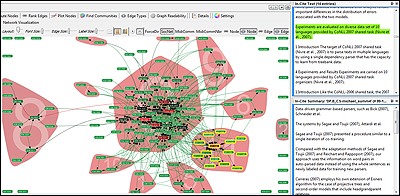 |

|
 |
Users can analyze the network of citations between papers and much more with Action Science Explorer. |
|
The National Science Foundation is featuring new visualization research by ISR-affiliated Professor Ben Shneiderman (CS/UMIACS) and his colleagues on the ?Discoveries? section of its website. The Shneiderman group's Action Science Explorer helps reveal emerging trends and controversies and encourages collaborations within the research community.
The ideas used in this prototype software some day could be widely implemented in existing and new systems. Recently, a medical imaging database developer called ASE ?a visually compelling yet easy to navigate system for viewing large sets of linked data.? He is considering adapting ASE to improve his product.
About Action Science Explorer
Action Science Explorer is partially an integration of two powerful existing tools: the SocialAction network analysis tool developed by Adam Perer and Ben Shneiderman in the Human-Computer Interaction Laboratory and JabRef, an open source bibliography reference manager.
SocialAction provides powerful network analysis capabilities including force-directed citation network visualization, ranking and filtering papers by statistical measures, scatterplots of paper attributes and statistics, categorical and numerical range coloring, and automatic cluster detection. JabRef supplies all the features one would expect from a reference manager, including searching using simple regular expressions, automatic and manual grouping of papers, DOI and URL links, PDF full text with annotations, abstracts, user generated reviews and text annotations, and many ways of exporting.
These tools are linked together to form multiple coordinated views of the data. Clicking on a node in the citation network selects it and its corresponding paper in the reference manager, displaying its abstract, review, and other data associated with it. Moreover, when clusters of nodes are selected their papers are floated to the top of the reference manager for easy perusal. The inverse is true as well, with any paper, group, or search term selected in the reference manager highlighting the corresponding nodes in the network.
Action Science Explorer supports rapid understanding of scientific literature. Users can analyze the network of citations between papers, identify key papers and research clusters, automatically summarize them, dig into the full text of articles to extract context, make annotations, write reviews, and finally export findings in many document authoring formats. The infrastructure enables users to generate readily-consumable surveys of scientific fields.
Action Science Explorer was developed by Cody Dunne, a Ph.D. candidate in Computer Science; Robert Gove, MS, Computer Science; Ben Shneiderman; Professor Bonnie Dorr (CS); and Judith Klavans, a senior research scientist in the University of Maryland Institute for Advanced Computer Studies (UMIACS).
| Read the NSF story |
Related Articles:
Ben Shneiderman video talk on human-centered AI now available
Work of Shneiderman, students featured on World Bank website
Shneiderman elected IEEE Fellow
New book by Ben Shneiderman focuses on Human-Centered AI opportunities
Shneiderman, Bederson, Wattenberg to receive IEEE VIS Test of Time Award
Shneiderman, Varshney inducted into IEEE Visualization Academy
Alumnus Ketan Babaria named CPO at Roofstock
New EventAction interface improves recommender systems
Shneiderman to speak at Arena Civil Dialogue, Aug. 12
Shneiderman receives honorary doctorate from Swansea University
December 13, 2011
|

